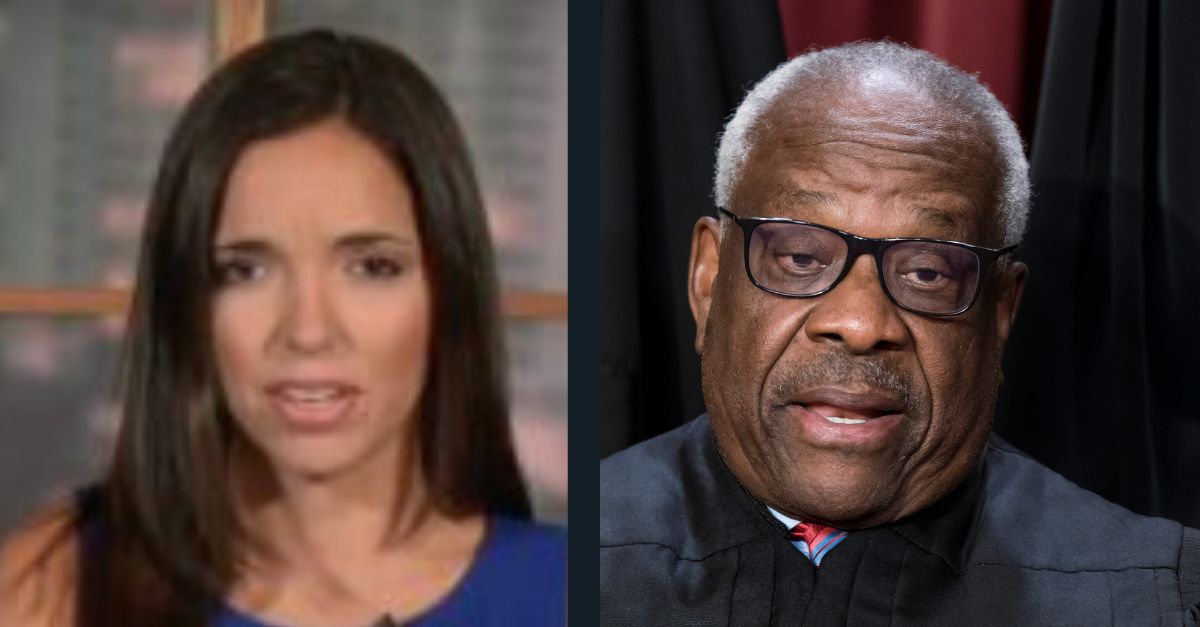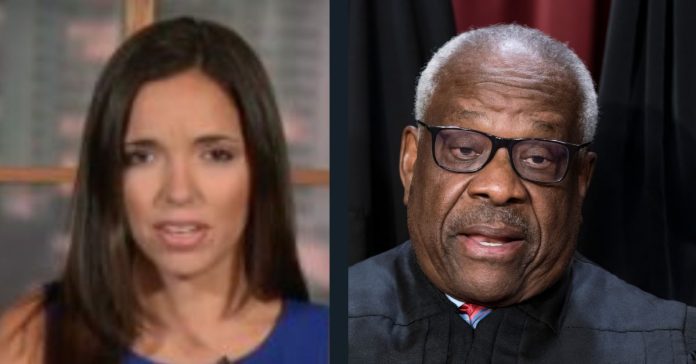
Left: Crystal Clanton (screengrab via YouTube/Fox News). Right: Supreme Court Justice Clarence Thomas (Drew Angerer/Getty Images).
Crystal Clanton, the attorney whose texts declaring “I HATE BLACK PEOPLE” sparked an investigation into two judges’ hiring practices, will begin working next term as a law clerk for Supreme Court Justice Clarence Thomas, who is Black.
“United States Supreme Court Justice Clarence Thomas has named Crystal Clanton, ’22, as a judicial clerk for the 2024-25 Term,” an announcement from the George Mason University Antonin Scalia Law School said.
The appointment is not particularly surprising, as Thomas has long been a supporter of Clanton’s conservative judicial efforts. As the New York Times reported, Thomas supported Clanton’s efforts early in her career to get a federal clerkship, including writing a letter of support conveying that he would consider her for a Supreme Court clerkship. She has also remained personally close to Thomas and his wife Ginni Thomas, the New York Times story said, apparently spending Thanksgiving with the couple in 2022.
Before she attended the Scalia Law School, Clanton was hired by the justice’s wife to assist with her media ventures. After graduating from law school, Clanton planned to start a yearlong clerkship with U.S. District Judge Corey Maze, a Donald Trump appointee, in Birmingham, Alabama. Once that was finished, Clanton expected to continue on with a second clerkship, this time with George W. Bush appointee Chief U.S. Circuit Judge for the 11th Circuit Court of Appeals William Holcombe Pryor Jr.
Clanton’s plans were thrown into disarray in November 2021 when a number of Democratic lawmakers sent a letter to Pryor and Chief Justice of the Supreme Court John Roberts about the two judges’ plans to hire Clanton as a clerk. The letter raised concerns about Pryor and Maze having “hired an individual with a history of nakedly racist and hateful conduct as a future law clerk in their chambers.”
The letter did not refer to Clanton by name, but said the unnamed clerk engaged in “alarming” behavior that constituted “a widely reported pattern of racist and bigoted conduct” when she was a national field director for conservative student group Turning Point USA.
Indeed a 2017 article detailed text messages Clanton sent to co-workers: “She sent a text message to a colleague stating ‘I HATE BLACK PEOPLE. Like f— them all … I hate blacks. End of story.””
The letter also said that the clerk in question would “exchange racist remarks regularly,” with co-workers, including anti-Muslim jokes including, “a bacon a day keeps the Islams away.” The behavior in question was said to have occurred when Clanton was 20 years old.
Clanton told media after she was shown screenshots of the texts that she had “no recollection” of messages sent when she was a “teenager,” and that they no longer reflected her current beliefs. She also reportedly remained close to both Ginni and Clarence Thomas at the time.
The letter sent by lawmakers urged Pryor and Maze to investigate the allegations, make a formal report of findings, and take whatever action necessary to maintain public trust in the federal judiciary.
The Judicial Council of the Second Circuit did conduct an investigation which concluded that there had been no judicial misconduct associated with Clanton’s hiring. The council dismissed the complaint after finding that Pyror and Maze had been aware of the allegations relating to Clanton, but that the two judges had reliable information that those allegations were false.
Despite calls for additional investigation into Clanton’s behavior, the Second Circuit decided last November that the matter was closed. That decision paved the way for Clanton to begin her work with Thomas during the upcoming term.
As a Supreme Court clerk, Clanton will be closely involved in ongoing litigation before the Court including assisting with the process of writing opinions and dissents. Supreme Court clerkships are the most highly-coveted positions in the legal field, with only 36 positions available to recent law school graduates each year.
The Judicial Conference of the United States, led by Roberts, will conduct the first of its two 2024 meetings on March 19 for the purpose of considering administrative and policy issues affecting the federal court system and making corresponding recommendations to Congress. The Campaign Legal Center, a watchdog group, made an official request Tuesday that raised concerns over Thomas’s alleged ethical violations relating to his failure to disclose various financial dealings. Thomas’s close relationships with billionaire donors and conservative activists have led to the justice’s facing a wave of criticism over behavior spanning decades.
Have a tip we should know? [email protected]

